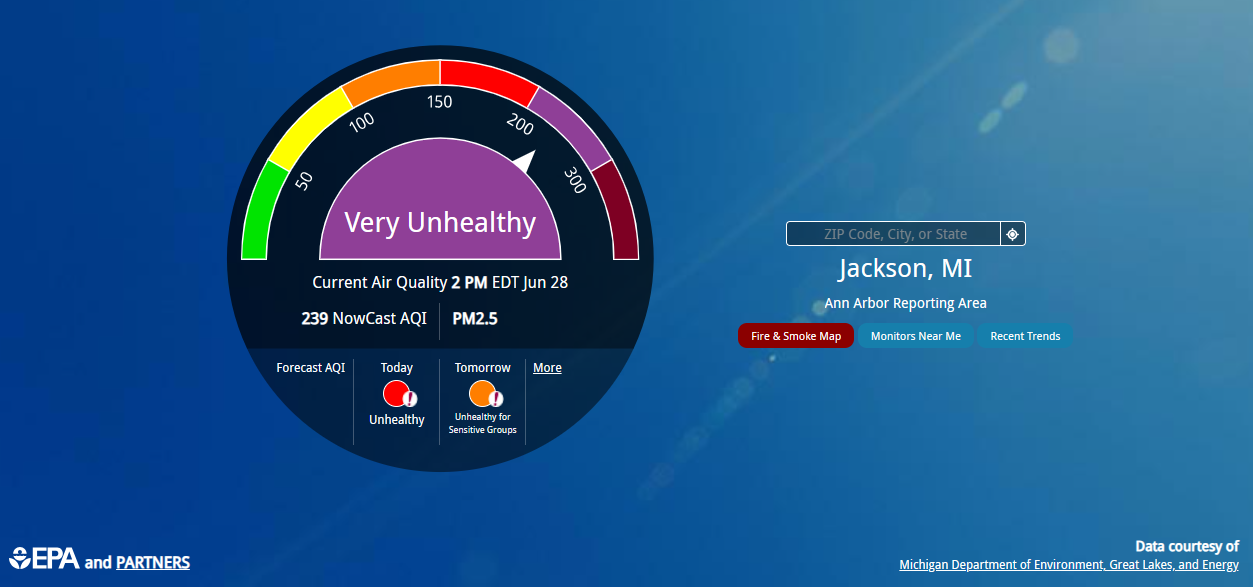From the Jackson County Health Department: The Michigan Department of Environment, Great Lakes, and Energy (EGLE) have issued air quality alerts for high levels of fine particulate in the air. These levels are caused by smoke from fires in Canada. Meteorologists are continuing to assess conditions and will issue additional alerts if necessary.
As of 2 p.m. on Wednesday, June 28, the air quality registers as “Very Unhealthy” and those in sensitive categories should avoid activities outdoors.

The Air Quality Index:
The Air Quality Index, or AQI is a color-coded way for residents to see what the levels of some types of air pollution are in their area. The higher the AQI, the worse the air quality is and the more cause for concern. To get current information about the air quality in your area see AirNow.gov
These resources may be helpful to you if you are looking to learn more about air quality in your area, specifically around wildfires and smoke impacts.
- US EPA Wildfires and Smoke map
- US EPA Interactive Map of Air Quality
- US EPA Fires and your health
- US EPA Particle Pollution
- EGLE Air Monitoring Information and interactive map
- Is burning allowed? and gov/OpenBurning
How to receive information about air quality:
You can sign up for alerts through the EnviroFlash system. This subscriber system allows you to choose the area you would like to get alerts for. The system will send the alert directly to your email or send you a text message. A mobile app is available through AirNow that provides a value and color code for the air quality.
Protecting your heath during smoke events:
Anyone can get sick from exposure to wildfire smoke but some people are more sensitive to particle pollution. Older adults aged 65 and older, pregnant people, children and people with lung and heart conditions may be more likely to get sick if they breathe in wildfire smoke. Symptoms from breathing in particle pollution from wildfire smoke can include wheezing, coughing and shortness of breath. If you have asthma, follow your asthma control action plan or contact your health care provider if you have symptoms. If you have heart disease and experience these symptoms, contact your health care provider.
The most protective option when air is unhealthy for you is to stay indoors with air conditioning, reduce strenuous activities and limit outdoor activities. If you have to be outside, N95 masks offer enhanced protection when used according to product instructions.
During unhealthy for sensitive groups (AQI orange) to unhealthy for everyone air quality events (AQI red), the following is advised:
For people with heart or lung disease, pregnant people, older adults aged 65+, children and teens it is suggested to take the following steps to reduce exposure:
- Avoid strenuous outdoor activities.
- Keep outdoor activities short.
- Consider moving physical activities indoors or rescheduling them.
For everyone else:
- Choose less strenuous activities (like walking instead of running).
- Shorten the amount of time you are active outdoors.
- Be active outdoors when air quality is better.
During very unhealthy or hazardous for everyone air quality (purple to maroon Air Quality Index levels):
- Stay indoors with the doors and windows closed using MERV-13 or better air filtration.
- Seek shelter elsewhere if you do not have an air conditioner and it is too warm to stay inside with the windows closed. Call or text 211 find out if there is a shelter or cooling center nearby.
- Use air filters to improve indoor air quality. Whether you have a central air conditioning system or a portable room unit, use high efficiency filters to capture fine particles from smoke. If you don’t have access to those filter systems, you can create a temporary air purifier with a 2012 or newer box fan and attaching a MERV-13 or higher air filter to it. Information is available online.
- Keep activity levels low.
- Avoid outdoor activities.
- Use N95 style masks if you have to be outside.
- Surgical and cloth masks are not recommended as they are not designed to prevent breathing in the fine particulate matter in wildfire smoke.
Additional helpful resources:
This has been a message from the Jackson County Health Department.







